A handful of the Service Transformation team recently made the trip up to Edinburgh to attend SDinGov 2023, which is a community event for people involved in designing and commissioning public services. It is a great opportunity to hear from and connect with others working in the public sector who are experiencing similar challenges and are happy to share the things they are learning.
The great thing about a few of us going this year was being able to spend some quality, in-person time together (we even snuck in an early morning hike up to Arthur’s Seat - the beautiful Scottish sunrise was definitely worth the early start!). It also meant we could divide and conquer across the different sessions. Between us we heard a lot of good stuff!
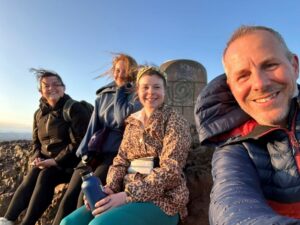
It was an inspiring and thought provoking 3 days, packed full of lots of learning and great conversations. And we wanted to make sure we shared as much learning as we could with the rest of the team.
Choosing what to share and how
Just deciding what to share was no mean feat. We’d been to so many great talks and workshops, how could we possibly condense 3 days down into a 2-hour slot at one of our Service Transformation team days!?
We all got together and talked about the sessions that we’d found most inspiring. The talk design studio Snook gave on how psychological safety enables inclusive design was a standout and we all agreed there was a lot in there that would be useful to share with the team.
But after that it was impossible to agree on just one other talk we wanted to share. So, we decided on a World Café format as a way of covering several topics quickly. We hadn’t run one of these for a while, but now felt like the right time to dust off our paper tablecloths and get talking!
Running our sharing sessions
Psychological safety
At SDinGov, we learned from a fantastic talk given by Snook that psychological safety amongst teams is absolutely key when the goal is to create products or services that have inclusivity at the heart of them. Why? Because psychological safety enables more voices to be heard at the table, and that diversity is what facilitates inclusive design.
Psychological safety involves two-way trust – not just giving other people the benefit of the doubt but feeling secure that others will give you the benefit of the doubt, too. Key to nurturing this two-way process is getting to know about each other and, in turn, caring about each other.
The most powerful step for building trust is self-disclosure: sharing something personal and vulnerable.- Adam Grant
So, we kicked the session off by splitting everyone into their discipline teams and asked them to talk about the 3 songs they would take with them if they were castaway to a desert island and why (think Desert Island Discs).
In no time at all there was lots of chatter and laughter in the room, as we all shared personal stories about songs that meant the most to us.
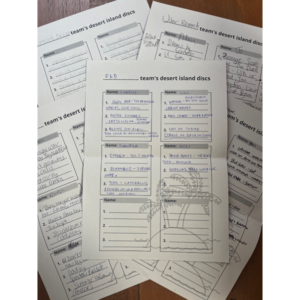
We’ve made a playlist of all the songs the team said they’d want with them if they were cast away. If you’re into an eclectic mix of heavy metal, pop, and everything in between give it a listen!
After getting everyone energised, Claire shared a story about "Ken,” the poster-boy for psychological safety. A chance meeting in a coffee shop had led to stories about education being shared; Ken’s first primary school, way back in the early 1960s, had been oppressive and run according to military ideals. After all, the teachers were all war veterans. Mistakes were shamed and students were openly humiliated for their errors. Ken became almost mute and didn’t contribute in classes. As a result, he failed his O Levels (prehistoric GCSEs!) and got a U in his maths.
After his failures, his parents forced him to continue education to try and get some qualifications and he went to a different college that had an entirely different approach. Collaborative teachers encouraged and celebrated mistakes as learning opportunities and gave every student an equal voice. Not only did Ken go on to ace his exams the next time, he became a teacher himself – Head of Maths, no less.
Ken felt like a perfect example of what can happen when someone feels psychologically safe in an environment where contributing is facilitated, and taking risks ultimately leads to success.
During SDinGov, and highlighted during their session, Snook had encouraged delegates to make a pledge, each going some way to creating psychological safety in a team environment. We shared this at our session, and our teammates made their pledges.
Which pledge would you have made?
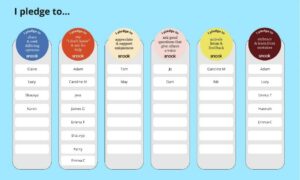
World Café
While everyone was out getting their coffee fix during the break (and hopefully having lots of conversations about psychological safety!), we had a rejig in the office to get ready for the World Café session. We ran it a bit like speed dating for learning. We had a couple of SDinGov’ers at each table to lead the discussion, and everyone else moved round the 4 tables, spending 10 minutes at each to hear and talk about some of the things we’d learnt.
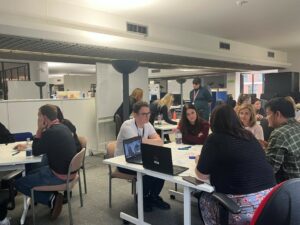
Table 1 - Inclusive design
On this table we discussed what we heard during an insightful talk from DWP Digital on designing for people with dyscalculia or low numeracy. We talked about what dyscalculia is and how it impacts daily life, gave examples of content that causes problems with dyscalculia and discussed the practical design guidance to make services more inclusive that had DWP Digital shared. We thought about what we as a team can do differently to improve the user experience for people with dyscalculia and low numeracy while using our services. One change we are making because of this discussion is to round the size of files on Essex.gov.uk and our Intranet to the nearest whole number.
Table 2 - Co-design
On this table we played back some of the things we’d heard during a talk from Humanly where they shared some great tips for carrying out research and co-design with children and another from Martha Edwards who reflected on whether co-design is futile. As a group we talked about:
- how we can involve co-design in their work
- how we can encourage our residents to get involved in co-designing with us
- how we can communicate the value of co-design to stakeholder
Table 3 - Systemic design
On this table we shared some of the things we’d learned during a workshop run by Version 1 about the system design framework and some tools that can be used to understand systemic issues and barriers and influence user behaviour. We reflected on our recent project to replatform Essex.gov.uk and then had a go at using a couple of the tools. We found them a useful way of thinking about the wider context around our work. We particularly liked the Pig Model, which got us thinking more broadly about the stakeholders around Essex.gov.uk and what the website might mean to them.
Table 4 - Eutopia or Utopia?
On this table we shared what we’d heard from Rochelle Gold during her keynote on the journey to Eutopia . We spoke about how Eutopia is the real world where we continuously learn, change, and improve and not let expectations exceed capacity. Whereas in Utopia perfection sometimes gets in the way of achieving outcomes. We also discussed some of the messages Steven Garrett shared about transforming organisations one service at a time, particularly around how it is important to focus on the power of delivery over excessive planning.
We asked everyone to share their “happy thoughts”, the small or big wins they were proud of, and it was great to see a very full tablecloth!
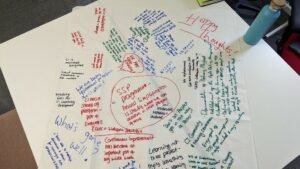
This is just the beginning
We think psychological safety is super important so we’re going to be doing some more in this space. We’ve set up a working group who have sent a survey out to the team to set a benchmark of how we’re doing at the moment. They’re going to use the results from the survey to help determine where we need to focus and what actions we might need to take.
We also all agreed that we really enjoyed the World Café format. It was a fun and interactive way to share information and have interesting conversations (and who doesn’t love being able to write on the tablecloth?!). We’ve decided we’ll be running more of these at our team days going forwards.
We’ll finish by saying if you get the opportunity to go to a future SDinGov – go! There’s such a warm and supportive atmosphere at the conference and it’s a great way to connect with other people working in Service Design in Government.
Do you have an interesting way that you share things you’ve learned at a conference with the rest of your team? We’d love to hear from you! Let us know in the comments below.
Leave a comment